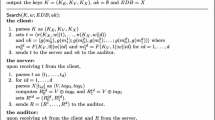Abstract
CertiCrypt [1] is a framework that assists the construction of machine-checked cryptographic proofs that can be automatically verified by third parties. To date, CertiCrypt has been used to prove formally the exact security of widely studied cryptographic systems, such as the OAEP padding scheme and the Full Domain Hash digital signature scheme. The purpose of this article is to provide a gentle introduction to CertiCrypt. For concreteness, we focus on a simple but illustrative example, namely the semantic security of the Hashed ElGamal encryption scheme in both, the standard and the random oracle model.
This work has been partially supported by the ANR project SCALP.
Preview
Unable to display preview. Download preview PDF.
Similar content being viewed by others
References
Barthe, G., Grégoire, B., Zanella Béguelin, S.: Formal certification of code-based cryptographic proofs. In: Proceedings of the 36th ACM Symposium on Principles of Programming Languages. ACM Press, New York (2009)
Goldwasser, S., Micali, S.: Probabilistic encryption. J. Comput. Syst. Sci. 28(2), 270–299 (1984)
Stern, J.: Why provable security matters? In: Biham, E. (ed.) EUROCRYPT 2003. LNCS, vol. 2656. Springer, Heidelberg (2003)
Bellare, M., Rogaway, P.: The security of triple encryption and a framework for code-based game-playing proofs. In: Vaudenay, S. (ed.) EUROCRYPT 2006. LNCS, vol. 4004, pp. 409–426. Springer, Heidelberg (2006)
Halevi, S.: A plausible approach to computer-aided cryptographic proofs. Cryptology ePrint Archive, Report 2005/181 (2005)
Shoup, V.: Sequences of games: a tool for taming complexity in security proofs. Cryptology ePrint Archive, Report 2004/332 (2004)
The Coq development team: The Coq Proof Assistant Reference Manual v8.2 (2008), http://coq.inria.fr
Sabelfeld, A., Sands, D.: A per model of secure information flow in sequential programs. Higher-Order and Symbolic Computation 14(1), 59–91 (2001)
Audebaud, P., Paulin-Mohring, C.: Proofs of randomized algorithms in Coq. Science of Computer Programming (2008)
Benton, N.: Simple relational correctness proofs for static analyses and program transformations. In: Proceedings of the 31th ACM Symposium on Principles of Programming Languages, pp. 14–25. ACM Press, New York (2004)
Jonsson, B., Larsen, K.G., Yi, W.: Probabilistic extensions of process algebras. In: Handbook of Process Algebra, pp. 685–711. Elsevier, Amsterdam (2001)
Nowak, D.: A framework for game-based security proofs. In: Qing, S., Imai, H., Wang, G. (eds.) ICICS 2007. LNCS, vol. 4861, pp. 319–333. Springer, Heidelberg (2007)
Barthe, G., Cederquist, J., Tarento, S.: A machine-checked formalization of the generic model and the random oracle model. In: Basin, D., Rusinowitch, M. (eds.) IJCAR 2004. LNCS, vol. 3097, pp. 385–399. Springer, Heidelberg (2004)
Corin, R., den Hartog, J.: A probabilistic Hoare-style logic for game-based cryptographic proofs. In: Bugliesi, M., Preneel, B., Sassone, V., Wegener, I. (eds.) ICALP 2006. LNCS, vol. 4052, pp. 252–263. Springer, Heidelberg (2006)
Author information
Authors and Affiliations
Editor information
Editors and Affiliations
Rights and permissions
Copyright information
© 2009 Springer-Verlag Berlin Heidelberg
About this paper
Cite this paper
Barthe, G., Grégoire, B., Heraud, S., Zanella Béguelin, S. (2009). Formal Certification of ElGamal Encryption. In: Degano, P., Guttman, J., Martinelli, F. (eds) Formal Aspects in Security and Trust. FAST 2008. Lecture Notes in Computer Science, vol 5491. Springer, Berlin, Heidelberg. https://doi.org/10.1007/978-3-642-01465-9_1
Download citation
DOI: https://doi.org/10.1007/978-3-642-01465-9_1
Publisher Name: Springer, Berlin, Heidelberg
Print ISBN: 978-3-642-01464-2
Online ISBN: 978-3-642-01465-9
eBook Packages: Computer ScienceComputer Science (R0)




